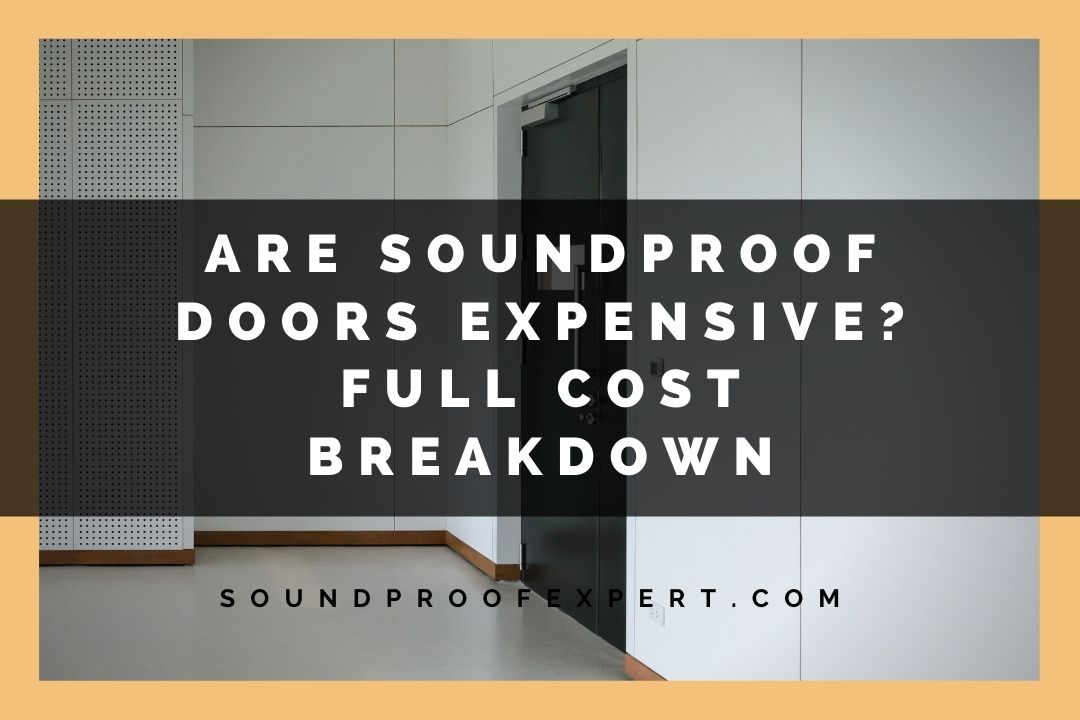
Dampening sounds from the street is key to preserving the peaceful bubble separating you from the outside world. Doorways are the largest opening in any wall, so the first step in your soundproofing mission should be to ensure that your doors block out as much noise as they can. There are a variety of soundproof doors in the market, but are they expensive?
Soundproof doors can be expensive, as they come with extra noise-reducing properties that typical doors don’t usually have. A soundproof glass door, in particular, can set you back $1,300 to $4,000 depending on its quality and size.
Here’s a handy guide on how much soundproof doors would cost you. I’ll also discuss ways to improve the sound-blocking capabilities of your existing doors if you want more budget-friendly options.
Soundproof Door Types and Prices
Doors are usually made of wood, steel, fiberglass, aluminum, or vinyl, each with varying levels of noise dampening abilities. Let’s go over two common types of sound-reducing doors and their corresponding prices.
Solid-Core Wooden Doors
Wooden doors are either hollow or solid inside. Solid core doors, being denser, can block more sound. If you prefer wooden doors, one of the first soundproofing solutions you’ll likely hear is simply to get a thicker solid core door.
Solid-core interior doors have an inner core of fiberboard and wood veneer layers. Sturdy, noise-blocking, and cheaper than solid wood doors (more expensive than hollow-core doors, though), solid-core doors are generally considered to strike a balance between quality and price. So how much would one cost you?
Solid-core door prices can start from $100 to $200. A high-grade or custom-designed door can set you back at least $400, which doesn’t yet include installation fees of around $150 to $250.
Glass Doors
When it comes to glass doors, soundproofing works through the use of double- or triple-pane laminated glass separated by air, according to Home Guide, a company that connects customers to experts on their specific needs.
The company’s website states that sliding doors made of soundproof glass cost $1,200 to $4,000 on average, excluding installation costs. This price range is close to the estimate by CostOwl that I mentioned earlier in the article.
Soundproof glass doors are pricier than dual-pane sliding doors, which cost between $450 and $2,100. HomeGuide shares another benefit to soundproof glass doors: they provide better insulation, which is great for your energy bill.
Sound Transmission and Noise Reduction Ratings
Now that you have an idea about the prices, let’s talk about two things you’ll likely come across when researching and looking for a soundproof door: STC (Sound Transmission Class) and NRC (Noise Reduction Coefficient).
Simply put, STC is a measure of how well a soundproofing material — a door, in our case — reduces sound transmission. A higher STC rating means the material is capable of blocking more sound, while a lower rating means the product is less able to block sound.
For example, an STC rating of 50 means loud sounds can be heard, but very faintly, compared to an STC rating of 25, in which even soft speech can be understood through the material, according to Acoustical Surfaces.
NRC, on the other hand, is a rating on a scale of 0 to 1 of how much sound an acoustic product can absorb, Audimute explains. A higher NRC means a better sound absorption capability, while an NRC of 0 indicates that the material doesn’t absorb any sound.
These terms are pretty technical, but knowing these ratings will help you make a more informed decision on which soundproof door to pick for your home.
How To Soundproof Your Current Door
What if you’d rather not spend on an entirely new door plus installation fees to achieve your soundproofing goals? Here are some products and methods you could try to help your door block more sound:
-
- Weatherstrip your door. Sound often leaks through gaps around doors, so consider using a door sweep, like the Suptikes 2 Pack Door Draft Stopper from Amazon.com, which is an easy-to-install one, or an adhesive seal strip to block these openings. These will also keep dust, bugs, and drafts out.
- Hang door curtains. A curtain will help absorb any sound transmitted through your door. Because mass is critical in soundproofing, heavier curtains will work better than flimsier fabrics. Residential Acoustics offers a retractable soundproof door cover that can be customized to fit your preferences.
- Install acoustic panels on your door. If you have a hollow-core door, simply sealing the gaps may not do a good enough job of keeping noise out. In this case, you can attach sound-absorbing panels to the door, like these panels, which are easy to shape and cut to size and can be used in homes, recording studios, control rooms, and offices. Acoustic panels can also be installed on walls in various arrangements, making them good not only for noise control but for aesthetic purposes.
- Add mass loaded vinyl to your door. Higher mass objects can block more sound (this is why thicker, heavier doors are better at sound control). One way you could add mass to your door is by installing mass loaded vinyl inside its core or on it, on the side that’s inside your room. This durable and flexible mass loaded vinyl weighs one pound per square foot.
Final Thoughts
Ensuring all your doors can block as much noise as possible is a crucial first step to achieving peace and quiet in your home. Getting a soundproof door is beneficial for its specific noise-reducing capabilities, but this is not the cheapest option: a soundproof glass sliding door could be worth as much as $4,000 on the high end of the range.
Fortunately, there are alternative ways to soundproof doors.You can try sealing all the gaps between the door and the wall and installing curtains or acoustic panels on the door to help with sound absorption.

Hey, Jim. Thank you for your invaluable advice, I’ve very much enjoyed your articles. I live in a 12 story building with concrete floors and ceilings, and sheetrock walls. As I’m sure you know, Sheetrock and concrete can carry noise quite easily. There is no laundry room in my apartment and I would like to install a washing machine. Obviously it would have to be installed in the kitchen—the bathroom is on the smaller side. I’ve done some research and there are a few smaller front loading washing machine models that are similar in size to a dishwasher and able to fit under the counter just like a dishwasher.
My problem: my neighbors right below my apartment have a newborn, and my neighbors right next to me are also expecting.
My question(s): do you think it would be possible to build an under counter soundproof cabinet to fit the washing machine? Built with sound insulation media on all sides, top and bottom, and the inside of the door? I know it’s possible to build anything; however, in your professional opinion, would it be effective at silencing / drastically reducing the washing machine noise?
If you think this would be an effective solution, what would be your recommendation on what materials to use? Thank you for your time and expertise on this matter.
Sincerely,
Marcus